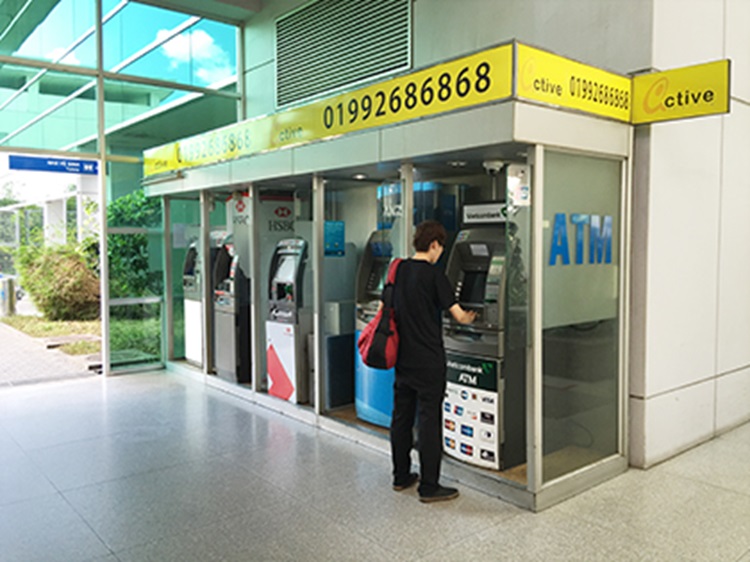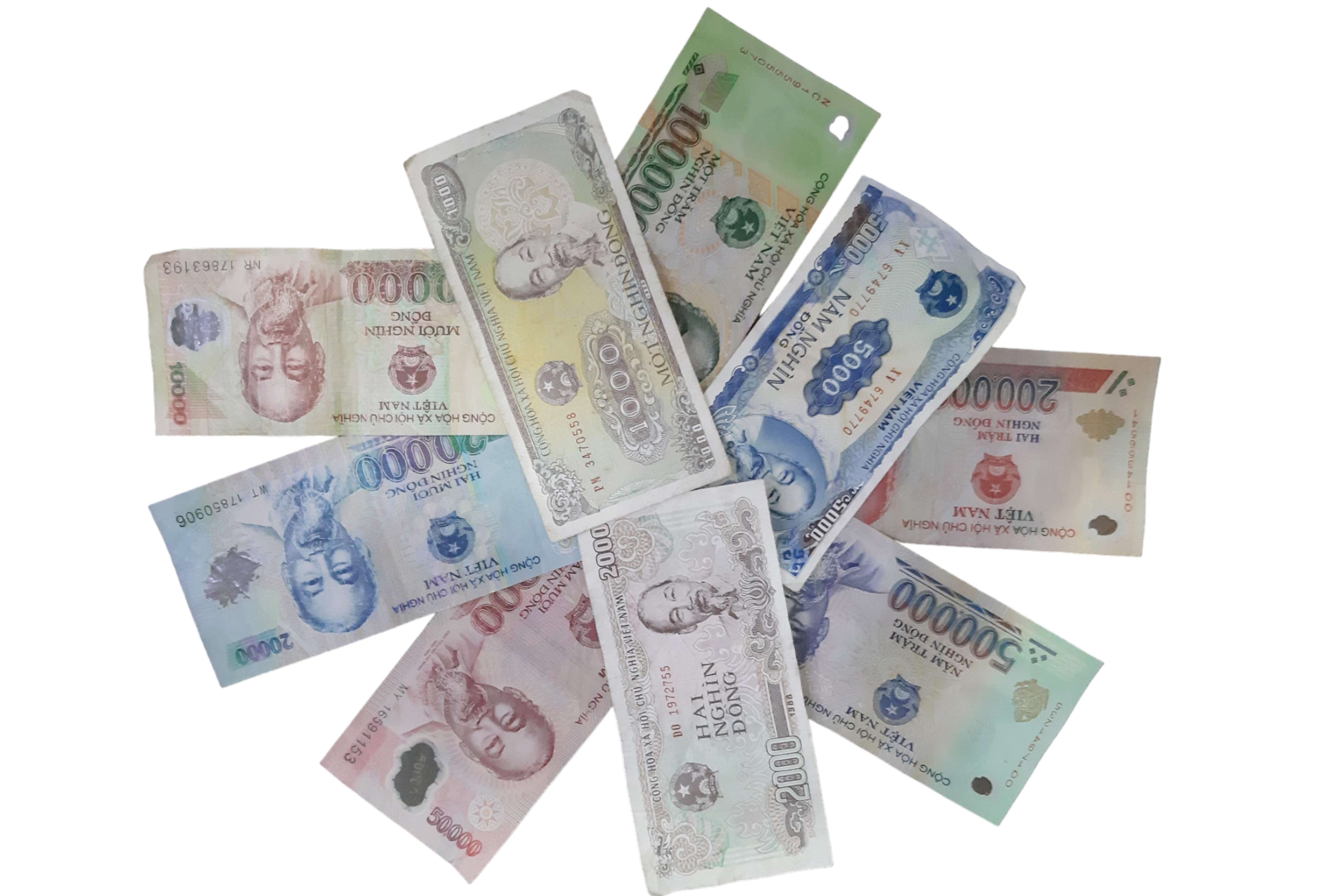Exchange Currency in Ho Chi Minh City: What You Need To Know

To exchange currency in Ho Chi Minh City at a good rate allows you to enjoy your trip as much as you want. You can find many currency changers in the city centre, but it’s essential to know where to get the best rate in Ho Chi Minh City.
Contents
Currency in Ho Chi Minh City and Vietnam
Vietnam is a cheap country for most travellers with the dollar and euro usually rising against the Vietnamese dong. Knowing the currency in Ho Chi Minh City will help you plan your budget and avoid scams.
An overview of Vietnamese currency
The Vietnamese dong (VND) is the official currency of Vietnam. Its name originates from the Vietnamese word for “copper”. VND has been used as the official currency of Vietnam since 1978 although it has undergone many changes over time.
Today, when talking about the amount of money in Vietnam, local people usually omit the currency and replace it with words like “thousand”, “million” and “billion”. There are a lot of denominations in Vietnam and they are either cotton or polymer.
• Cotton-based notes: VND 200 (rarely used), VND 500 (rarely used), VND 1,000, VND 2,000, VND 5,000
• Polymer notes: VND 10,000, VND 20,000, VND 50,000; VND 100,000, VND 50,000, VND 200,000 and VND 500,000
In Vietnam, don’t expect to use coins. The Vietnamese government has paused issuing coins at various points, with the last resuming production in 2003. It was not until April 2011 that the State Bank of Vietnam eventually withdrew its distribution.
Prices in big cities
Obviously, Vietnam is an affordable country for travellers on a multi-day trip. Though prices in big cities like Hanoi or Ho Chi Minh City might be relatively higher than those in other parts of the country, you don’t have to feel sorry for your expenses.
USD 1 is approximately 24,000 VND. So, many visitors are easily surprised by the huge amount of money they’ve got after the exchange.
Ho Chi Minh City is one of the least expensive cities in the world. With roughly USD 50 in Ho Chi Minh City, you can enjoy almost all of the must-haves. If you are willing to spend more than that, you can travel like a king for sure.
Now, take a look at how your dollars will make you become “an instant millionaire”.
| Hotels | 5-star hotels: from USD 90/ night 4-star hotels: from USD 50/ night 3-star hotels: from USD 30/ night 2-star hotels and below: from USD 10/ night |
|
| Transportation | Train: from USD 14 (HCMC – Mui Ne | hard seat) Bus: less than USD 2 Taxi: from USD 0.55 | waiting time (1 hour): from USD 1.2 |
|
| Food | Street food and cheap restaurants: from USD 1.5 Meal for 2 people, mid-range restaurant, three-course: from USD 24 McMeal at McDonalds (or equivalent combo meal): from USD 4.1 |
|
| Tour activities | Cu Chi Tunnels entrance ticket: USD 4.5 (Ben Duoc Tunnels) and USD 3.8 (Ben Dinh Tunnels) War Remnant Museum entrance ticket: USD 1.75 for adults and USD 0.88 for children Independence Palace entrance ticket: USD 2.64 for adults and USD 0.6 for children |
|
See more where to find the best place to stay in Ho Chi Minh City District 1.
Best places to exchange currency in Ho Chi Minh City
You don’t have to exchange money before you travel to Vietnam. There are a lot of places where you can exchange money in Ho Chi Minh City but not all of them offer a good rate. To avoid getting ripped off by bad rates, check out these places where you can expect the best currency exchange in Ho Chi Minh City.
Ho Chi Minh City’s airport currency exchange
You can easily find some currency exchange booths at Tan Son Nhat International Airport. If you haven’t got any Vietnamese dongs in your pocket, it’s good to exchange some to cover taxi fares. However, bear in mind that the exchange rate is typically unfavourable.
Both Terminal 1 (domestic terminal) and Terminal 2 (international terminal) have money changers. Terminal 2 seems to have better exchange rate than Terminal 1.
Terminal 1
The money exchange counter is offered by Vietinbank in the Arrival Hall on the 1st level, opposite D2 entrance. As it is a national bank, the opening hours are limited. It opens from Monday to Friday, from 8:00 to 11:30 and from 13:00 to 16:30. Check the exchange rate from Vietinbank’s official website.
Terminal 2
There are a lot of money changers at Terminal 2 of Tan Son Nhat International Airport. You can find some of them below:
• Airside, near gates 17 and 18
• Landside, opposite check-in area row D, (Departure Hall)
• On the left outside the immigration counters (Arrival Hall)
• The public area on the ground level
Banks for exchanging currency in Ho Chi Minh City
For those who ask where to exchange money in Ho Chi Minh City, banks are the safest places. Nevertheless, the process is quite slow and you will be charged a commission rate from 0.5% to 2%. It’s easy to find banks around the city, especially in District 1 Ho Chi Minh City.
Around Bui Vien Street – the backpacking area
• Vietinbank Bui Vien: 36 Bui Vien St, Pham Ngu Lao Ward, District 1
• Saigonbank Pham Ngu Lao: 333 Pham Ngu Lao St, Pham Ngu Lao Ward, District 1
Around Ben Thanh Market
• Saigon SCB Ben Thanh: 50 Bis – 52 & 46/10 Pham Hong Thai St, Ben Thanh Ward, District 1
• Vietinbank: 13 Phan Chu Trinh St, Ben Thanh Ward, District 1
• Ban Viet Bank Ben Thanh: 26-28-28/1 Pham Hong Thai St, Ben Thanh Ward, District 1
Jewellery and gold shops
You can go to jewellery and gold shops on main streets in the city centre for better deals without commission or complicated procedures. Here are some prestige places:
Around Bui Vien Street – the backpacking area
• Kim Mai Jewelry Shop: 84C Cong Quynh, Pham Ngu Lao Ward, District 1
• Minh Thu Money Changer: 22 Nguyen Thai Binh St, District 1
Around Ben Thanh Market
• Mai Van Gold: 1 Nguyen An Ninh St, Ben Thanh Ward, District 1
• Ha Tam Jewelry: 2 Nguyen An Ninh St, Ben Thanh Ward, District 1
• 109 Exchange Money 24/24: 109 Ho Tung Mau St, Ben Nghe Ward, District 1
• Currency exchange company Minh Thu: 22 Nguyen Thai Binh St, Nguyen Thai Binh Ward, District 1
Other locations
• Currency Exchange Eximbank 59: 135 Dong Khoi St, Ben Nghe Ward, District 1
• Hung Long Money Exchange: 86 Mac Thi Buoi St, Ben Nghe Ward, District 1
A very common practice in Vietnam is that most money changers do not display current currency exchange rates. It is very inconvenient for customers and you may need to ask around to choose the best deal.
Tips for exchanging currency in Ho Chi Minh City
With a lot of Vietnamese dongs, you may have in your hands, it’s more than ever crucial to remember some tips for safety.
How much money do you need in Ho Chi Minh City?
According to the law, you must declare on arrival if the amount exceeds VND 15,000,000 or USD 5,000. The average cost for a 7-day trip in Ho Chi Minh City is around VND 14,000,000 (USD 568). Don’t change money all at once. It will be inconvenient to carry a lot of Vietnamese dongs around, not to mention that it might put you at risk.
Cash vs cards

Vietnam is moving fast towards digital payment. At most hotels, restaurants and tourist areas in Ho Chi Minh City, you can pay by debit and credit cards like Visa and Mastercard. However, an extra charge of 3%-4% for every single purchase may be applied to these cardholders.
Another option is to withdraw cash at ATMs. It is easy to find an ATM in the city centre. When you withdraw from ATMs, you will automatically receive cash in Vietnamese dong based on the bank rate at that time. The transaction fees vary from bank to bank.
Understanding different types of banknotes
The Vietnamese banknotes are divided into two groups: the cotton-based notes with low value and the polymer notes with high value. The polymer VND 500,000 has the highest value. You should avoid using high-denomination notes for public transportation or street vendors as they will have trouble getting change. A solution is to buy something at a convenience store, there’s a good chance that they have enough change.
When you pay with a polymer note, you may receive a lot of different cotton-based notes. Don’t worry, they can be useful for purchasing many casual items at wet markets in Ho Chi Minh City. Just one thing to keep in mind – they are easily damaged by water. On the other hand, polymer notes are more resistant to water damage but they may stick together.
Extra tips when you exchange currency in Ho Chi Minh City

• Different USD notes will get a different exchange rate when you exchange money at jewellery and gold shops.
• Exchange money just enough to pay for taxi fares at the airport and no more than that, you can get a better exchange rate in the city centre.
• Count the money carefully as you will easily receive a lot of change.
• Don’t accept damaged notes from others as it will be difficult to use them later.
• Check the polymer notes carefully to make sure that you get the authentic notes and avoid mix-ups.
• All denominations of the Vietnamese dong are marked by the national figure Ho Chi Minh, so take a look at the backside of the banknotes to differentiate between them.
• There is no set rule for tipping in Vietnam, but it will be much appreciated if you tip for private services (usually 5-10% of the total cost).
• While you may see the prices at Ho Chi Minh City’s airport written in US dollars, it is not recommended to pay with USD as they will be converted at a lower exchange rate.
If you travel to Vietnam for the first time, don’t forget to read some tips for first-time visitors. You will have an insightful view of how to avoid inconvenience.
Read more on Ho Chi Minh City Travel Tips: What To Know Before Your Visit?
By now you should have a general idea of exchanging currency in Ho Chi Minh City. Take heed of the advice mentioned above and you will be happy to splurge on a hassle-free trip.